In Japanese, yokatta よかった means "was good," "I'm glad," "that's a relief," "thank goodness," and "it would have been better [if...]," depending on context.
It's the past form of ii いい. Its antonym is warukatta 悪かった.
Kanji
The word yokatta written with kanji is yokatta 良かった, but it's often written with hiragana, as yokatta よかった instead.
Grammar
The literal meaning of yokatta is "was good." From this meaning, you end up with several usages depending on the sentence structure. To summarize:
- To say something was good. That you're glad that something happened. That it's a relief that something happened.
- are ga yokatta
あれがよかった
That was good. (literally.) - yokatta
よかった
[Something] was good.
I'm glad. (that something that was good happened.)
It's a relief. (that something that was good happened.)
Thank goodness. (that something that was good happened.)
- are ga yokatta
- To say that doing something was good, that you're glad you did it, that you're glad something happened, or glad something was true.
- {benkyou shite} yokatta
勉強してよかった
{[Me] studying} was good.
[I'm glad] [I] studied. - {kimi de} yokatta
君でよかった
{[It] being you} was good.
[I'm glad] [it] was you. - {sagi janakute} yokatta
詐欺じゃなくてよかった
{[It] not being a scam} was good.
[I'm glad] [it] wasn't a scam.
- {benkyou shite} yokatta
- To say something that didn't happen was good, which is bad, because it would have been better if the good thing had happened.
- {motto benkyou sureba} yokatta
もっと勉強すればよかった
[It] would have been good {if [I] had studied more}.
It would have been better if I had studied more. - {kawanai} hou ga yokatta
買わない方が良かった
{Not buying [it]} would have been good.
It would have been better if I hadn't bought it.
- {motto benkyou sureba} yokatta
"Was Good"
The literal meaning of yokatta is "was good." This is the past form of ii いい, or rather, of yoi 良い, which means "is good."
- tenki ga ii
天気がいい
The weather is good. - tenki ga yoi
天気が良い - tenki ga yokatta
天気がよかった
The weather was good.
Every expression which contains ii いい in Japanese can be turned into past tense by replacing it with yokatta よかった. For example:
- un ga ii
運がいい
[Your] luck is good.
You're lucky. - un ga yokatta
運が良かった
[Your] luck was good.
You were lucky. (were it not for your luck you would have died right there.)
- naka ga ii
仲がいい
[Their] relationship is good.
They're friends. - naka ga yokatta
仲がよかった
[Their] relationship was good.
They were friends.
- kakko-ii
カッコいい
[You're] good-looking.
You're cool. - kakko-yokatta
カッコよかった
[You] were good-looking.
You were cool. (that. Was. AWESOMEEEE~~~!!!)
- kimochi-ii
気持ちいい
[It] is good-feeling.
[It] is pleasant. - kimochi-yokatta
気持ちよかった
[It] was good-feeling.
[It] was pleasant. - ~hou ga ii
~方がいい
[This] way is good.
It's better if... - ~hou ga yokatta
~方がよかった
[This] way was good.
It would have been better if...
All usage of yokatta derives from this "was good" meaning.
"I'm Glad"
The word yokatta can translate to English as "I'm glad" when used alone. Literally, it means something "was good," in the sense that what happened "was good," so you're glad that it happened.
- Context: food has been offered.
- oishii desu!
おいしーです!
It's delicious! - sou ka
そうか
I see. - yokatta
良かった
I'm glad. (that you liked it.)
"That's a Relief"
Depending on context, yokatta can better translate to "that's a relief" instead of "I'm glad."
- Context: a woman meets psychics. After confirming they actually have psychic powers:
- yokatta...
{honmono no} kata desu ne...
よかった・・・本物の方ですね・・・
That's a relief... [you] are {real} [psychics], aren't you?- honmono
本物
Real. Genuine. As opposed to "fake," nisemono 偽物. - kata
方
Used to people to people.You're "people" who are real [psychics].
- honmono
- {{mae ni} intaanetto de
soudan shita} toki wa {tekitou na}
koto iwareta no de...
前にインターネットで
相談した時は適当な
こと言われたので
[It's a relief], because: when {[I] consulted on the internet {before}} [I] was told {"appropriate"} things.- tekitou
適当
Appropriate, often used in a lazy, deceiving sense. She was told "appropriate" things, things "appropriate" for a real psychic to say, so they didn't have psychic powers, but talked as if they were psychics. They were trying to deceive her, and she's relieved to have found real ones this time.
- tekitou
Although "relief" implies the speaker was somehow troubled, this is manga we're talking about, so sometimes the speaker caused the trouble themselves.
- Context: Shinkouhyou 申公豹 blasts Taikoubou 太公望 with a powerful attack, who retaliates, giving Shinkouyou a little cut in the cheek. Shinkouyou asks his cat to check if Taikoubou survived, and then, after confirming he survived the attack:
- yokatta~
よかったー
That's a relief. - ha?
は?
Hah? (the cat doesn't get why he's relieved the guy he was going to kill is still alive.) - watashi wa
umarete go-sen-nen
hajimete
jibun no chi wo
mimashita
私は生まれて五千年初めて自分の血を見ました
In the five thousand years [I] have been born [it] is the first time I've seen [my] own blood. - Taikoubou...
太公望・・・ - watashi wa kare wo
raibaru ni
kettei shimasu
私は彼をライバルに決定します
I've decided he's [my] rival.
"Thank Goodness"
Sometimes, yokatta is better translated as "thank God" or "thank goodness" instead, or something similar. The literal meaning of the word hasn't changed—yokatta never means "thanks"—it's just the translation that changed.
- yokatta.........
よかった・・・・・・・・・
Thank God......... - poro
ポロ
*tear dropping* - haa......
はぁ・・・・・・
Ahh...... - ureshii...... ureshii......
嬉しい・・・・・・嬉しい・・・・・・
I'm glad..... I'm glad......- ureshii
嬉しい
Happy. Glad.
- ureshii
よかったじゃない?
The phrase yokatta janai? よかったじゃない? means "wasn't that a good thing?" or "shouldn't you be glad that that happened?" Literally, it's closer to "isn't it yokatta?" Some variants include:
- Context: a girl gets a
stalkerguy who loves her. - yokatta janee ka
よかったじゃねーか
That was a good thing, wasn't it?
Shouldn't you be glad? - yome no morai-te ga atte yoo
嫁のもらい手があってよォ
That there's [someone] to take you as a wife.- morai-te
もらい手
"Taker." From morau もらう, "to take," and the te 手 part means someone who does an action, in this case: taking. Not to be confused with "taking one's hand," which's not a Japanese expression.
- morai-te
~てよかった
The phrase ~te-yokatta ~てよかった is the te-form of a verb plus yokatta. It means "I'm glad that X happened."
More technically, it means "the predicate holding true was good." For example:
- {benkyou shite} yokatta
勉強してよかった
{[Me] studying} was good.
I'm glad that {[I] studied}.- shite - te-form of suru する, "to do."
The Japanese te-form is tenseless. The tense of the te-form is derived from the matrix clause. In this case, yokatta is in the matrix, and yokatta is past-tensed, so the te-form becomes past-tensed, too.
Literally, benkyou shite is a bit similar to "[someone] studying," which is tenseless in English. It translates to English as "[someone] studied" in past tense in order to agree with the tense of "was good."
Some more examples:
- {kite} yokatta
来てよかった
{[Me] coming [here]} was good.
I'm glad that {[I] came [here]}.- kite - te-form of kuru 来る, "to come."
- {mite} yokatta
見てよかった
{[Me] seeing [it]} was good.
I'm glad that {[I] saw [it]}. - ganbatte yokatta
頑張ってよかった
I'm glad I did my best.
I'm glad I put effort. (because it paid off.)- ganbaru
頑張る
To try hard. To put effort. To try one's best.
- ganbaru
- hanashite yokatta
話してよかった
I'm glad we talked.- hanasu
話す
To talk. To have a conversation.
- hanasu
- kiite yokatta
聞いてよかった
I'm glad I heard it.
I'm glad I asked.- kiku
聞く
To hear. To listen.
To ask something.
- kiku
- ikite yokatta
生きてよかった
I'm glad I lived.- ikiru
生きる
To live.
(one of the heaviest phrases you can make with yokatta.)
- ikiru
- nyuubu shite yokatta
入部してよかった
I'm glad I joined this club.
(because of all the friendships, memories, et cetera I made along the way.)- nyuubu suru
入部する
To enter a club.
- nyuubu suru
- {aete} yokatta yo!
会えて良かったよ!
{[Me] meeting [you]} was good."
I'm glad that {[I] met [you]}.- au
会う
To meet.
- au
As you'd imagine, this ~te yokatta is often used in sentimental situations.
- toki ga sugite, ima, kokoro kara ieru
anata ni aete yokatta ne
時が過ぎて 今 心から言える
あなたに会えてよかったね
Time passed, now, I can say from my heart,
I'm glad I met you. - —Anata ni Aete Yokatta あなたに会えてよかった by Koizumi Kyoko 小泉今日子, album Afropia (1991).[lyrics from mojim.com, accessed 2019-02-01]
~でよかった
The phrase ~de-yokatta ~でよかった works just like ~te-yokatta, meaning "I'm glad that something happened." The only difference is that in this case we have a predicate whose te-form ends in ~de ~で instead of ~te ~て.
There are two such predicates.
- The godan verbs that suffer renjoudaku 連声濁, which are the ones that have ~gu ~ぐ, ~bu ~ぶ, ~nu ~ぬ, ~mu ~む endings.
- yomu
読む
To read. - {yonde} yokatta
読んでよかった
{[Me] reading [it]} was good.
I'm glad that [I] read [it]. (before doing something.)
- yomu
- The da だ copula, used after adjectives, nouns, etc., whose te-form is the de で copula.
- kimi da
君だ
[It] is you. - {kimi de} yokatta
君でよかった
{[It] being you} was good.
I'm glad that {[it] was you}.- Again, de で only translates to "was" because yokatta in the matrix is past-tensed. Normally to say "was" you'd instead say:
- kimi datta
君だった
[It] was you.
- kimi da
- buji de yokatta
無事でよかった
I'm glad [you're] unharmed.
- buji da
無事だ
To be unharmed. For nothing to have happened with.
- buji da
Counterfactuals
The phrase yokatta can be used together with a conditional to mean "it would have been better if." This is typically used when you regret not having done something, or you picked the wrong choice.
This is an instance of a counterfactual, which is when you say "it would have been X if Y happened, but Y didn't happen." With the "I'm glad" meaning, Y was factual, but with the "I should have done that," Y isn't factual any longer, it hasn't happened.
~ばよかった
The phrase ~ba yokatta ~ばよかった is the ba-form plus yokatta. It's used when you haven't done something, and you regret not doing it.
- Context: it begins raining.
- zaaaaa
ザァァァァ
*rain noises* - konna koto nara
konbini de kasa φ
kaeba yokatta
こんなことなら
コンビニで傘
買えばよかった
If [it] were to be something like this
it would have been better if [I] had bought
an umbrella at the convenience store.- kaeba - ba-form of kau 買う, "to buy."
~ならよかった
The phrase ~nara yokatta ~ならよかった works the same way as ~ba yokatta. The only difference is that nara なら, or naraba ならば, is the ba-form of the da だ copula.
- Context: a girl and her friend became high school girls.
- zutto {chuugakusei no} mama nara
yokatta noni na~
ずっと中学生のままなら
よかったのになー
Even though it would have been better if
[we] remained middle school students forever.- {chuugakusei no} mama da
学生のままだ
To be continually {middle school students}.
To remain {middle school students}.
- {chuugakusei no} mama da
~方がよかった
The phrase ~hou ga yokatta ~方がよかった is ~hou ga ii in past tense.
The phrase ~hou ga ii is used to say that one method is good compared to others, i.e. it's better if you do things one way, rather than another.
As a counterfactual, it ends up meaning that you should have done something that way, rather than the way you chose.
- Context: character regrets his appearance.
- bansoukou...
tsuketenai hou ga yokatta na
バンソウコウ・・・
つけてない方がよかったな
It would have been better if if [I] hadn't put a band-aid.- Fun fact: band-aid is a brand name, the generic name is "adhesive bandage."
- ...kami mo kitte-kureba yokatta
・・・髪も切ってくればよかった
...the hair, too, would have been better if [I] had gone cut it.- kitte-kureba - ba-form of:
- kitte-kuru
切ってくる
To cut and come. To go cut and come back.
するんじゃなかった
The phrase ~n janakatta ~んじゃなかった is sometimes used to say that something shouldn't have been done, similar to how yokatta works. Literally, it means "was not," in the sense of something "wasn't to be," ideally wasn't to have occurred. For example:
- Context: rich woman boards train.
- {{binbou kusai} tanin to
issho no} ressha nanka ni
noru-n-jaa nakatta wa...
貧乏くさい他人と
いっしょの列車なんかに
乗るんじゃあ なかったわ・・・
I shouldn't have boarded a train {together
with {[all these peasants]}}.- {binbou kusai} tanin
貧乏くさい他人
People [who] {smell of poverty}. (literally.) - jaa
じゃあ
In this case, same as ja じゃ, but she pronounces it longer.
- {binbou kusai} tanin
- shitei-seki tottatte
koe ga tsutsu-nuke jaa nai
指定席とったって
声がつつぬけじゃあない
Even though [they] call [it] a reserved seat,
[you] can hear voices through the walls, can't you?- She's complaining there's nothing special about the seat, since she can hear the peasants talking anyway.
- to-ttatte とったって
to itta tte と言ったって
to itta toshite-mo と言ったとしても
to itte-mo と言っても
Even if you call it. Even if you say it is. - tsutsu-nuke
筒抜け
To be overheard.
- konna-n-dattara
inemuri dekinai kedo
kuruma de kuru-n-datta wa
こんなんだったら
居眠りできないけど
車でくるんだったわ
If it's like this
I wouldn't be able to sleep but
I should have come by car.- Since janakatta can mean you shouldn't have done something, it makes sense that datta can mean you should have done something.
The phrase ~n-janakatta ~んじゃなかった is a contraction of ~no dewanakatta ~のではなかった.
- Context: the battle ends without a fight.
- konna koto nara
こんな事なら
If it were to be like this... - go-sen mo hei wo tsurete-kuru no dewanakatta
5千も兵を連れて来るのではなかった
I shouldn't have brought [all these] five thousand soldiers.- mo も particle - here, it emphasizes the number 5000. It implies that maybe bringing 100 would suffice, rather than implying he shouldn't have brought any of the 5000.

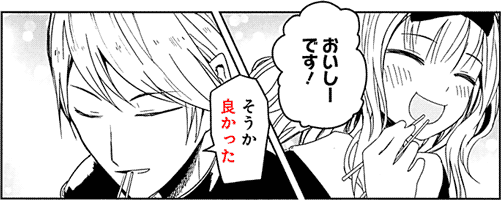

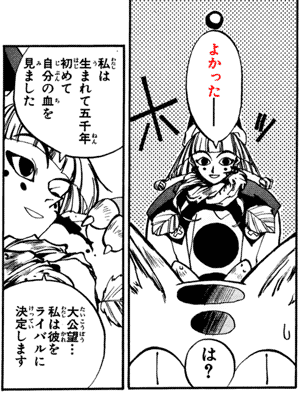
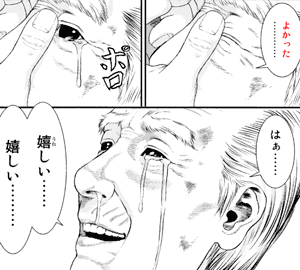
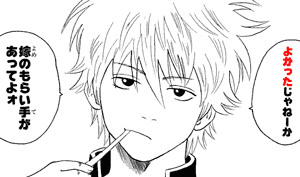
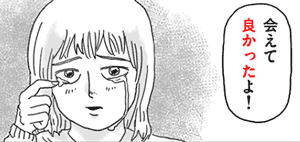

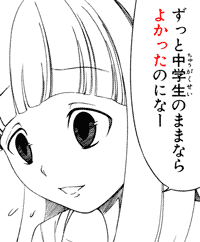
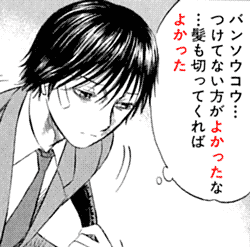
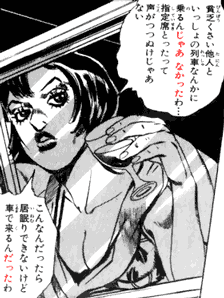
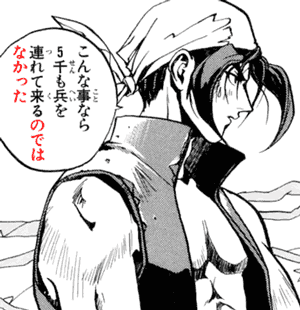
No comments: